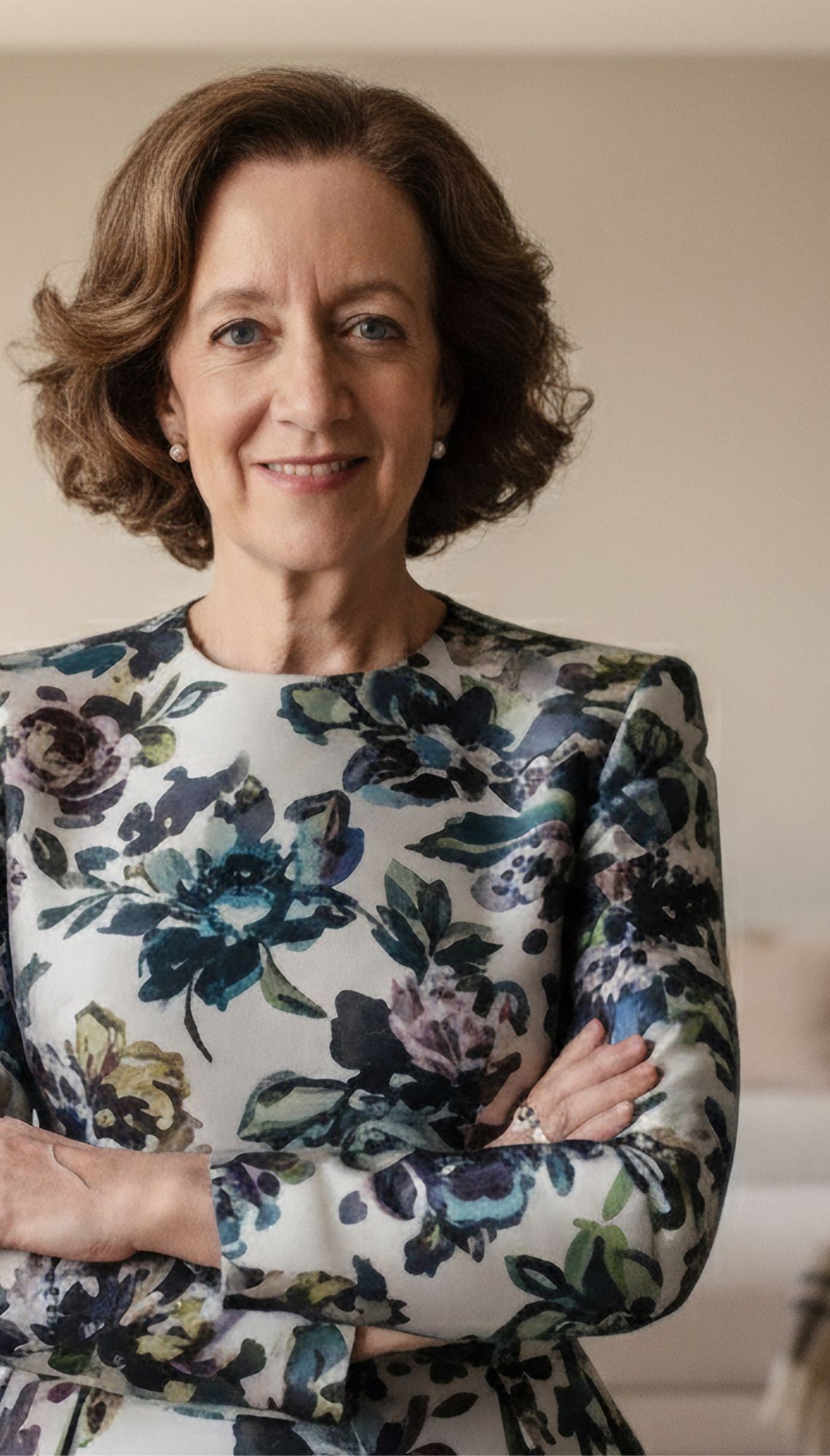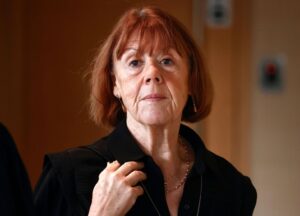On Leadership, Partnership & Long-term Impact
By May Ikeora-Amamgbo & Daniel Agusi
Carmen Gonzalez, Director of the WONDER Foundation, has spent decades working to ensure that women and girls around the world can access education, dignity, and opportunity. From her childhood in Spain as the eldest of nine children, to her early days cleaning houses in the UK while studying, her journey has been shaped by resilience, empathy, and a deep conviction that education transforms lives. Under her leadership, WONDER Foundation has grown into a global network supporting over 160,000 women and girls across four continents. In this interview, Carmen shares her personal journey, her philosophy on leadership and collaboration, and her vision for building a future where women and girls everywhere can thrive.
Q1. On a personal level, what experiences shaped your passion for empowering women and young people, and how have they influenced your path as a leader?
I was born into a very loving family, the eldest of nine children, with eight sisters. So I was surrounded by women. My father used to say he was “blessed among women” he loved it, even joking that he was like the Virgin Mary in the Hail Mary prayer, until my brother was born.
We were comfortable but not rich; my sisters and I used the sitting room as our bedroom. Our parents had the means, skills and networks to give us a world-class education. I remember once, when I was about six or seven, I failed an exam and told my mother, “It’s not fair.” She replied, “There are so many girls more clever and hardworking than you, but they don’t have the chance to go to school.”
That honestly changed me. It opened my eyes to realities beyond my own. From then on, I became curious: Who are these girls? Where are they? Why don’t they have opportunities? That moment sparked my lifelong desire to ensure that girls everywhere can access education and dignity.
At seventeen, I came to the UK. To support myself, I cleaned houses and met a whole new world of Spanish migrants working in anything they could to give their children a better life. Later, at university, I worked in poorer areas of London starting homework clubs for children from Bengali, Afghan and other immigrant families. I discovered England’s huge variety and inequality.
During my master’s, I lived in a hall with women from all over the world. Despite our different backgrounds, our aspirations were the same: to learn, to be treated with dignity, and to build better lives. Meeting young women who were denied the chances I’d enjoyed made me realize how arbitrary opportunity can be, and how transformative education and mentoring are.
Q2. We know you’ve been traveling. How was your trip to Kazakhstan, and what exactly were you doing there?
In Kazakhstan, the situation of women is very different. Until about 10 or 20 years ago, women had no rights. In some areas, marriage happened through kidnapping and rape. Even though laws have changed, customs take a long time to shift, especially in the south. That’s why we’ve come to work with our partner there, who is doing great work.
This trip was short, just four days, but I’ve been doing this kind of work for a long time. It’s interesting to learn about the situation of women in different parts of the world.
Q3. Leading a foundation comes with challenges; what has been your most defining leadership lesson, and how has it shaped you?
Our work is poetry, it is a work of art that requires constant attention, but it is also science.
Two lessons stand out for me: the need to always learn, and the need to keep my peace. For me, peace is abundance, not just the absence of war. It’s an attitude of the soul.
My most defining lesson has been to listen first and act second. Women in the communities we serve taught me that partnership is essential. I remember once in Kenya, before we formalised WONDER, I saw a disused well. Foreign students had built it without asking the village. The community already had another well they preferred. That experience reinforced that community-led solutions are crucial.
As a leader, I see my role as creating space for others to thrive, nurturing talent within my team, and aligning everyone around our mission. Leadership is not about control; it is about service, empathy, rigorous thinking, and accountability.
Q4. How did the name WONDER Foundation come about?
We wanted something positive and uplifting. “Wonder” means marvel, something beautiful. But it also stands for Women’s Network for Educational Resources.
We began as a network of different organisations, Wavecrest School of Hospitality in Nigeria, Canada Foundation, Mauritius Trust and now we have partners in Kazakhstan, Poland and many other countries.
We are not a charity that just arrives and imposes projects. We coordinate, support, and finance what women in their own communities are already doing. All our projects are led by local women.
Q5. WONDER Foundation places education and mentorship at the heart of its mission. How do you see these tools changing opportunities for women and girls in the communities you serve?
Education and mentorship are transformative. Studies show that quality education equips women and girls with skills to participate in decision-making, pursue careers and advocate for their rights. Vocational training and mentoring increase women’s independence and empower them to act as catalysts for change.
We see girls who once doubted their worth become confident students, nurses, teachers and entrepreneurs. Mentorship provides guidance, but also something just as important: a network. If you don’t have networks, you are isolated. That’s where we work.
To education and mentoring we add three more pillars: family engagement, employment opportunities, and building networks. The ripple effect is profound: educated women invest in their families and communities, creating a cycle of empowerment that lasts for generations.
Q6. In Nigeria and other places, organizations often compete instead of collaborating. What advice would you give to small organizations about collaboration?
Don’t live out of fear. Fear is paralyzing. Be generous. When you collaborate, you learn and grow. Sometimes you won’t get funding, but you might get free help, skills, or valuable lessons. Collaboration always creates good.
When NGOs panic and compete, they survive rather than thrive. Collaboration keeps us generous, peaceful, and creative.
Q7. The landscape of charity is shifting, with more focus on lasting change. How does WONDER Foundation make sure its initiatives go beyond short-term relief?
Traditional models that focus only on immediate relief can create dependency and fail to address root causes. Sustainable models, by contrast, empower communities to become self-sufficient.
At WONDER, we prioritize education, skill development, and community-led solutions. We invest in local partner schools, mentor teachers, support families, and co-design culturally relevant programmes. We measure success not just in numbers, but in long-term outcomes, graduates entering decent work, starting businesses, or becoming mentors themselves.
Emergency relief has its place, and we respond when crises hit, but our focus is always resilience and agency.
Q8. In this age of social media and personal branding, many use “women empowerment” as a tool for visibility, rather than truly doing the work. How do you feel about this?
Honestly, I don’t care. People can do what they want. I’m not in this for personal credit. I want to support women and girls. If someone else takes the credit, I don’t mind. Maybe they need that validation.
What matters is peace. Peace gives clarity. Anxiety makes us miss what is right in front of us, like when you lose your keys but they’re in your bag. It’s the same in life. Staying calm and centered matters more than appearances.
Q9. Looking ahead, what are your ambitions for WONDER Foundation, and how do you see its role in addressing the changing needs of women and girls worldwide?
Our ambition is to reach even more women and girls with opportunities that enable them to thrive in a rapidly changing world. We plan to expand scholarships and mentoring, deepen partnerships in Africa, Asia and Latin America, and explore digital learning so girls in remote areas aren’t left behind.
We also want to respond to emerging needs, like technology skills and climate-resilient livelihoods. As crises from conflict to climate change intensify, WONDER will continue to advocate for girls’ education and build networks of women leaders who can influence change in their own communities.
Q10. One of our biggest focuses is on raising girls, not just supporting women later in life. How can we catch them young and build strong women of tomorrow?
It begins in the family. If mothers know th
eir worth and live with dignity, daughters will learn the same. Sometimes women enable harmful behaviour in men without realising it. We need to raise daughters with strength and clarity about right and wrong.
It’s also about balance in families, sharing responsibilities equally. Children learn by example: girls from their mothers, boys from their fathers.
That’s why WONDER also works with families. If we educate a girl but her parents force her into marriage, the problem only grows worse. Involving families ensures that education leads to lasting change.
Q11. As a closing reflection, what message, mantra or mindset would you offer to women everywhere on how to honour their worth, build meaningful wealth, and safeguard their overall wellbeing?
Remember you are not in the world by chance. God created you and you have immense value.
Honour your worth by remembering it isn’t defined by someone else. Build wealth not only in financial terms but in knowledge, skills, relationships, and health. Invest in your education and training, it pays dividends for life.
Seek mentors and commit to mentoring others. Be intentional with money: save, invest, and ask for what you deserve. At the same time, recognise that true prosperity includes your mental and physical wellbeing, as well as your family’s.
Set boundaries, rest without guilt, and cultivate friendships that nurture you. Above all, stay curious, stay connected, and stay compassionate with yourself and with others.







